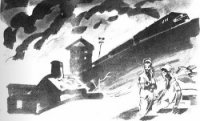Go Set a Watchman - Lee Harper (книги без регистрации полные версии TXT) 📗
Instead, Maycomb grew and sprawled out from its hub, Sinkfield’s Tavern, because Sinkfield made the surveyors drunk one evening, induced them to bring forward their maps and charts, lop off a little here, add a bit there, and adjust the center of the county to meet his requirements. He sent them packing the next day armed with their charts and five quarts of shinny in their saddlebags—two apiece and one for the Governor.
Jean Louise could never make up her mind whether Sinkfield’s maneuver was wise; he placed the young town twenty miles away from the only kind of public transportation in those days—river-boat—and it took a man from the south end of the county two days to journey to Maycomb for store-bought goods. Consequently, the town remained the same size for over 150 years. Its primary reason for existence was government. What saved it from becoming another grubby little Alabama community was that Maycomb’s proportion of professional people ran high: one went to Maycomb to have his teeth pulled, his wagon fixed, his heart listened to, his money deposited, his mules vetted, his soul saved, his mortgage extended.
New people rarely went there to live. The same families married the same families until relationships were hopelessly entangled and the members of the community looked monotonously alike. Jean Louise, until the Second World War, was related by blood or marriage to nearly everybody in the town, but this was mild compared to what went on in the northern half of Maycomb County: there was a community called Old Sarum populated by two families, separate and apart in the beginning, but unfortunately bearing the same name. The Cunninghams and the Coninghams married each other until the spelling of the names was academic—academic unless a Cunningham wished to jape with a Coningham over land titles and took to the law. The only time Jean Louise ever saw Judge Taylor at a dead standstill in open court was during a dispute of this kind. Jeems Cunningham testified that his mother spelled it Cunningham occasionally on deeds and things but she was really a Coningham, she was an uncertain speller, and she was given to looking far away sometimes when she sat on the front porch. After nine hours of listening to the vagaries of Old Sarum’s inhabitants, Judge Taylor threw the case out of court on grounds of frivolous pleading and declared he hoped to God the litigants were satisfied by each having had his public say. They were. That was all they had wanted in the first place.
Maycomb did not have a paved street until 1935, courtesy of F. D. Roosevelt, and even then it was not exactly a street that was paved. For some reason the President decided that a clearing from the front door of the Maycomb Grammar School to the connecting two ruts adjoining the school property was in need of improvement, it was improved accordingly, resulting in skinned knees and cracked crania for the children and a proclamation from the principal that nobody was to play Pop-the-Whip on the pavement. Thus the seeds of states’ rights were sown in the hearts of Jean Louise’s generation.
The Second World War did something to Maycomb: its boys who came back returned with bizarre ideas about making money and an urgency to make up for lost time. They painted their parents’ houses atrocious colors; they whitewashed Maycomb’s stores and put up neon signs; they built red brick houses of their own in what were formerly corn patches and pine thickets; they ruined the old town’s looks. Its streets were not only paved, they were named (Adeline Avenue, for Miss Adeline Clay), but the older residents refrained from using street names—the road that runs by the Tompkins Place was sufficient to get one’s bearings. After the war young men from tenant farms all over the county flocked to Maycomb and erected matchbox wooden houses and started families. Nobody quite knew how they made a living, but they did, and they would have created a new social stratum in Maycomb had the rest of the town acknowledged their existence.
Although Maycomb’s appearance had changed, the same hearts beat in new houses, over Mixmasters, in front of television sets. One could whitewash all he pleased, and put up comic neon signs, but the aged timbers stood strong under their additional burden.
“You don’t like it, do you?” asked Henry. “I saw your face when you walked in the door.”
“Conservative resistance to change, that’s all,” said Jean Louise behind a mouthful of fried shrimp. They were in the Maycomb Hotel diningroom sitting on chromium chairs at a table for two. The air-conditioning unit made its will known by a constant low rumble. “The only thing I like about it is the smell’s gone.”
A long table laden with many dishes, the smell of musty old room and hot grease in the kitchen. “Hank, what’s Hot-Grease-in-the-Kitchen?”
“Mm?”
“It was a game or something.”
“You mean Hot Peas, honey. That’s jumping rope, when they turn the rope fast and try to trip you.”
“No, it had something to do with Tag.”
She could not remember. When she was dying, she probably would remember, but now only the faint flash of a denim sleeve caught in her mind, a quick cry, “Hotgreaseinthekit-chen!” She wondered who owned the sleeve, what had become of him. He might be raising a family out in one of those new little houses. She had an odd feeling that time had passed her by.
“Hank, let’s go to the river,” she said.
“Didn’t think we weren’t, did you?” Henry was smiling at her. He never knew why, but Jean Louise was most like her old self when she went to Finch’s Landing: she seemed to breathe something out of the air—“You’re a Jekyll-and-Hyde character,” he said.
“You’ve been watching too much television.”
“Sometimes I think I’ve got you like this”—Henry made a fist—“and just when I think I’ve got you, holding you tight, you go away from me.”
Jean Louise raised her eyebrows. “Mr. Clinton, if you’ll permit an observation from a woman of the world, your hand is showing.”
“How?”
She grinned. “Don’t you know how to catch a woman, honey?” She rubbed an imaginary crew cut, frowned, and said, “Women like for their men to be masterful and at the same time remote, if you can pull that trick. Make them feel helpless, especially when you know they can pick up a load of light’ud knots with no trouble. Never doubt yourself in front of them, and by no means tell them you don’t understand them.”
“Touche, baby,” said Henry. “But I’d quibble with your last suggestion. I thought women liked to be thought strange and mysterious.”
“No, they just like to look strange and mysterious. When you get past all the boa feathers, every woman born in this world wants a strong man who knows her like a book, who’s not only her lover but he who keepeth Israel. Stupid, isn’t it?”
“She wants a father instead of a husband, then.”
“That’s what it amounts to,” she said. “The books are right on that score.”
Henry said, “You’re being very wise this evening. Where’d you pick up all this?”
“Living in sin in New York,” she said. She lighted a cigarette and inhaled deeply. “I learned it from watching sleek, Madison Avenuey young marrieds—you know that language, baby? It’s lots of fun, but you need an ear for it—they go through a kind of tribal fandango, but the application’s universal. It begins by the wives being bored to death because their men are so tired from making money they don’t pay any attention to ’em. But when their wives start hollering, instead of trying to understand why, the men just go find a sympathetic shoulder to cry on. Then when they get tired of talking about themselves they go back to their wives. Everything’s rosy for a while, but the men get tired and their wives start yellin’ again and around it goes. Men in this age have turned the Other Woman into a psychiatrist’s couch, and at far less expense, too.”
Henry stared at her. “I’ve never heard you so cynical,” he said. “What’s the matter with you?”




